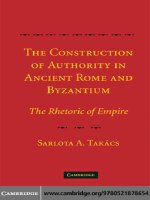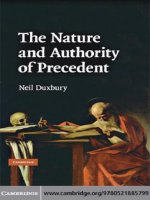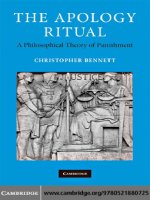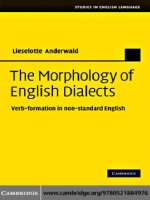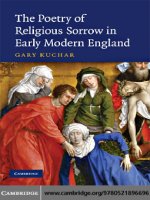0521020697 cambridge university press the trial of the gospel an apologetic reading of lukes trial narratives oct 2005
Bạn đang xem bản rút gọn của tài liệu. Xem và tải ngay bản đầy đủ của tài liệu tại đây (978.57 KB, 269 trang )
This page intentionally left blank
THE TRIAL OF THE GOSPEL
For many years Luke–Acts has been studied as a work of history
and theology. The Trial of the Gospel sets out to examine Luke’s
writings as an apologetic work, by focusing on those parts of Luke’s
story where the apologetic overtones seem most prominent – the
trial narratives. By analysing the trials of all major Lukan
characters – Jesus, Peter, Stephen, and Paul – Alexandru Neagoe
argues that the narratives are best understood when viewed as part
of Luke’s apologia pro evangelio, a purpose which is in keeping
with the author’s declared aim to give his readers ‘assurance’ about
the ‘matters’ in which they had been instructed (Luke 1.4). Neagoe
concludes that the specific role of the trial narratives is to provide
the framework within which important tenets of the Christian faith
are themselves put ‘on trial’ before the reader, with the intended
result of the gospel’s confirmation.
A L E X A N D R U N E A G O E is Lecturer at the Areopagus Centre for
Christian Education and Contemporary Culture and Pastor of the
Romania.
First Baptist Church, Timisoara,
,
SOCIETY FOR NEW TESTAMENT STUDIES
MONOGRAPH SERIES
General Editor: Richard Bauckham
116
THE TRIAL OF THE GOSPEL
The Trial of the Gospel
An Apologetic Reading of
Luke’s Trial Narratives
ALEXANDRU NEAGOE
The Pitt Building, Trumpington Street, Cambridge, United Kingdom
The Edinburgh Building, Cambridge CB2 2RU, UK
40 West 20th Street, New York, NY 10011-4211, USA
477 Williamstown Road, Port Melbourne, VIC 3207, Australia
Ruiz de Alarcón 13, 28014 Madrid, Spain
Dock House, The Waterfront, Cape Town 8001, South Africa
© Alexandru Neagoe 2004
First published in printed format 2002
ISBN 0-511-02956-X eBook (Adobe Reader)
ISBN 0-521-80948-7 hardback
To Nu,ti, my love
CONTENTS
Preface
List of abbreviations
1
Introduction
Trials and apologetics in Luke–Acts: setting the scene
Previous research on apologetics in Luke–Acts
Conclusion
The present approach: thesis, plan of work, and method
PART ONE
page xi
xii
3
3
4
21
22
JESUS ON TRIAL
2
Narrative precedents of Jesus’ trial
Introduction
Previous studies on the trial of Jesus in the Third Gospel
The plot leading to Jesus’ trial
Jesus’ prediction and explanation of his trial
Conclusion
27
27
28
35
50
60
3
Luke’s account of Jesus’ trial
Introduction
The hearing before the Sanhedrin (22.66–71)
The initial trial before Pilate (23.1–5)
The trial before Herod (23.6–12)
Again before Pilate (23.13–25)
Conclusion
62
62
62
70
76
82
89
4
The trial of Jesus in narrative retrospection
Introduction
The post-trial section of Luke’s passion narrative
(Luke 23.26–56)
91
91
92
ix
x
List of Contents
Jesus’ resurrection: the final vindication of the Messiah
The trial of Jesus in Acts
Conclusion
PART TWO
5
106
112
125
THE CHURCH ON TRIAL
The trials of Peter
Introduction
Jesus’ prediction of the disciples’ trials
(Luke 12.11–12; 21.12–15)
Peter’s trials and existing paradigms for Lukan apologetics
Peter’s trials in recent studies
The trial of Peter and John (Acts 4.1–31)
The trial of Peter and the apostolic group (Acts 5.17–42)
Conclusion
132
137
139
140
145
149
6
The ‘trial’ of Stephen
Introduction
The function of Luke’s story of Stephen: previous research
Stephen’s trial re-examined
Conclusion
152
152
154
158
172
7
The trials of Paul
Introduction
The function of Paul’s trials in Acts: previous research
Paul’s trials re-examined
Conclusion: the trial of the gospel
175
175
176
187
213
8
Conclusions
The apologetic function of Luke’s trial narratives: a synopsis
Implications for other areas of Lukan study
Suggestions for further related research
219
219
222
225
Bibliography
Index of biblical passages
Index of subjects
131
131
228
243
251
PR E FA C E
I cannot hope here to do justice to all those who have made possible
the completion of this book, but special mention must be made of the
following: I am honoured to express my special gratitude to Professor
Max Turner, for his sharp yet constructive advice, and for the model
of scholarly competence combined with Christian commitment which
I saw in him as supervisor of my PhD dissertation on which the book
is based. (The dissertation was supervised at London Bible College and
submitted to Brunel University in the spring of 1998.) Thanks are also due
to my second supervisor, Dr Conrad Gempf, for his willingness to offer
critical evaluation on certain areas of my research and to my friend James
McGrath, who undertook the tedious task of proofreading the thesis.
Throughout the period of my research, the Romanian Missionary Society fully covered my tuition fees and several other costs – special thanks
are due to Les and Dottie Tidball and Alan and Ann Penrose. Most of
my living expenses were covered by the Emmanuel Church, Northwood;
I shall never know all those who contributed, but Ann Bailey and Keith
and Joan Alsop must be singled out for their constant help and affection.
Generous gifts also came from the Keswick Convention, the Jerusalem
Trust, and the Castle Street Church, Tredegar. To all these, I can only say
a heartfelt ‘Thank you.’
I am also deeply grateful to my parents and to my sister’s family for
their ceaseless prayers on my behalf during the period of my studies. Last
but not least, special thanks are due to my precious wife Nuti,
, who kindly
accepted to put up with a very busy husband during the first few months
of our marriage, while the preparations for publication were being made.
xi
AB B R E V I A TIONS
ABD
ANQ
AV
BAFCS
BETL
BHPT
Bib
BK
BR
BTB
BWANT
BZ
CBQ
ETL
EvQ
Exp
ExpT
FRLANT
GELNT
HTR
ICC
Int
JBL
JOTT
JSNT
xii
D. N. Freedman et alii (eds.), The Anchor Bible Dictionary,
6 vols., New York: Doubleday, 1992
Andover Newton Quarterly
Authorized Version
The Book of Acts in Its First Century Setting
Bibliotheca ephemeridum theologicarum lovaniensium
Bibliotheca historico-philologico-theologica
Biblica
Bibel und Kirche
Biblical Research
Biblical Theology Bulletin
Beitr¨age zur Wissenschaft vom Alten und Neuen
Testament
Biblische Zeitschrift
Catholic Biblical Quarterly
Ephemerides theologicae lovanienses
Evangelical Quarterly
The Expositor
The Expository Times
Forschungen zur Religion und Literatur des Alten und
Neuen Testaments
J. P. Louw and E. A. Nida (eds.), Greek–English Lexicon
of the New Testament Based on Semantic Domains, 2 vols.,
United Bible Societies, 1988
Harvard Theological Review
International Critical Commentary
Interpretation
Journal of Biblical Literature
Journal of Translation and Textlinguistics
Journal for the Study of the New Testament
List of abbreviations
JSNTSup
JTS
LXX
MT
n.d.
NEB
Neot
NIDNTT
NIGTC
NIV
NovT
NTG
NTS
RB
RHPR
RQ
RSR
RSV
SBL
SBLDS
SBLMS
SBT
SC
ScEsp
SNTSMS
ST
StudBT
TDNT
TLZ
TNTC
TQ
TU
xiii
Journal for the Study of the New Testament, Supplement
Series
Journal of Theological Studies
The Septuagint
The Masoretic Text (of the Old Testament)
not dated
New English Bible
Neotestamentica
C. Brown (ed.), New International Dictionary of New
Testament Theology, 4 vols., revised edition, Carlisle:
Paternoster, 1992
New International Greek Testament Commentary
New International Version
Novum Testamentum
New Testament Guides
New Testament Studies
Revue biblique
Revue d’histoire et de philosophie religieuses
Restoration Quarterly
Recherches de science religieuse
Revised Standard Version
Society of Biblical Literature
SBL Dissertation Series
SBL Monograph Series
Studies in Biblical Theology
The Second Century
Science et esprit
Society for New Testament Studies Monograph Series
Studia theologica
Studia biblica et theologica
G. Kittel and K. Friedrich (eds.), Theological Dictionary of the New Testament, translated from German by
G. W. Bromiley, 9 vols., Grand Rapids: Eerdmans, 1964–
76
Teologische Literaturzeitung
Tyndale New Testament Commentary
Teologische Quartalschrift
Texte und Untersuchungen
xiv
TynB
WTJ
WUNT
ZNW
ZTK
List of abbreviations
Tyndale Bulletin
Westminster Theological Journal
Wissenschaftliche Untersuchungen zum Neuen Testament
Zeitschrift f¨ur die neutestamentliche Wissenschaft
Zeitschrift f¨ur Theologie und Kirche
I N T R OD U C T ION
1
I N T R OD U C T ION
Trials and apologetics in Luke–Acts: setting the scene
Luke’s1 special interest in forensic trials has often been recognised in
Lukan scholarship.2 The textual evidence for such a concern on Luke’s
part abounds.3 While in the Gospels4 of Matthew and Mark Jesus predicts
the disciples’ trials only once (Matt. 10.17–20; Mark 13.9–11), in the
Third Gospel he does so twice (12.11–12; 21.12–15). Similarly, whereas
for the other two Synoptics Jesus’ trial includes only two episodes (one
before the Sanhedrin and one before Pilate), in Luke’s Gospel four trial
scenes are recorded: one before the Sanhedrin (22.66–71), a preliminary
hearing before Pilate (23.1–5), a peculiarly Lukan episode before Herod
(23.6–12), and a second session before Pilate (23.13–25). As one turns
to Acts, the evidence is even more ample. After a brief presentation of
the origins and lifestyle of the early Christian community in Jerusalem,
the reader encounters two extensive trial scenes involving Peter (4.1–31;
1 The author of both the Third Gospel and Acts will be referred to throughout as Luke.
The common authorship (as well as narrative unity) of the two books is advocated or assumed by numerous recent Lukan studies: so, for example, W. S. Kurz, Reading Luke–Acts:
Dynamics of Biblical Narrative, Louisville: Westminster/John Knox, 1993; I. H. Marshall,
‘Acts and the “Former Treatise”’, in B. W. Winter and A. D. Clarke (eds.), The Book of Acts in
its Ancient Literary Setting, BAFCS, vol. I, Grand Rapids: Eerdmans; Carlisle: Paternoster,
1993, pp. 163–82; R. Pesch, Die Apostelgeschichte, Evangelisch-Katholischer Kommentar
zum Neuen Testament 5:1–2, Z¨urich and Neukirchen-Vluyn: Benzinger, 1986, especially
pp. 24–5; R. C. Tannehill, The Narrative Unity of Luke–Acts: A Literary Interpretation,
2 vols., Minneapolis: Fortress, 1986, 1990. Even when the generic, narrative, and theological unity has been called into question (M. C. Parsons and R. I. Pervo, Rethinking the Unity
of Luke and Acts, Minneapolis: Fortress, 1993), the authorial unity has remained largely
unchallenged.
2 See, for instance: J. H. Neyrey, The Passion According to Luke: A Redaction Study of
Luke’s Soteriology, New York: Paulist Press, 1985, pp. 84–5; A. A. Trites, ‘The Importance
of Legal Scenes and Language in the Book of Acts’, NovT 16 (1974), 278–84.
3 For more detail on the evidence listed here, see the relevant sections below.
4 To help distinguish between ‘Gospel(s)’ as New Testament literary documents and
‘gospel’ as the content of the Christian belief and proclamation, I shall write the former
with an initial capital and the latter without.
3
4
The Trial of the Gospel
5.17–42). These are soon followed by an even lengthier account of the trial
and martyrdom of Stephen (6.9–7.60). Finally, Paul’s whole missionary
activity is scattered with conflicts and challenges which are often cast
in a trial form, culminating, undoubtedly, with Paul’s judicial history
between his arrest in Jerusalem (21.27) and his two-year stay in Rome
(28.30–1). It is not without justification, then, that Neyrey can write:
‘Forensic trials in Acts have an incredible scope: (a) all of the major figures
of Acts (Peter, Stephen, and Paul) are tried, (b) in all of the significant
places where the Gospel was preached (Judea, Jerusalem, Achaia, and
Rome); (c) the trials take place before Jewish courts as well as Roman
tribunals.’5
It is somewhat intriguing, in view of such a significant Lukan emphasis,
that there is to date not a single monograph specifically exploring Luke’s
use of the trial motif. The attention has tended to focus instead on individual trial scenes or, at most, on the trial(s) of a single Lukan character –
mainly Jesus or Paul.6 To the extent to which the question of authorial
intent has been raised with regard to the trial material in larger sections of
Luke–Acts, this has been done only indirectly, mainly in connection with
the representation of Luke–Acts as some form of apologia. It is important,
therefore, to introduce this discussion of Luke’s trial motif with a more
general survey of previous research on apologetics in Luke–Acts and thus
acquire a better grasp of the angles from which Lukan trials have been
interpreted in the past. This survey is at the same time necessary in view
of the fact that the present study itself proposes an apologetic reading of
Luke’s trial motif.
Previous research on apologetics in Luke–Acts
The present survey7 aims to include both works which have explicitly applied ‘apologetic’ terminology to aspects of Luke–Acts and works which
have noted in Luke’s writing tendencies which would naturally belong
5
Neyrey, Passion, p. 85.
For bibliographical information relating to individual Lukan characters, see the relevant chapters below.
7 A partly similar survey of Lukan apologetics to the one presented here can be found in
S. E. Pattison, ‘A Study of the Apologetic Function of the Summaries of Acts’, unpublished
PhD dissertation, Emory University, 1990, pp. 10–35. Several observations justify my own
review. First, the number and importance of the works which have been produced since
Pattison’s thesis are indicative of the need for a more up-to-date survey. Second, Pattison’s
survey is limited to Acts; this one includes Luke’s Gospel. Third, only very limited attention
is given by Pattison to works which I shall list under the heading ‘An apologia for the
gospel’(see pp. 12–21) – his survey does not in fact include such a category.
6
Introduction
5
to what we regard as ‘Christian apologetics’.8 Due to the fluidity of the
term in its contemporary use, its meaning within the present work needs
to be defined here. When used with reference to a first-century context, I
take ‘Christian apologetic’ (which I use interchangeably with ‘Christian
apologia’) to mean the exercise of advocating the reliability of the Christian faith, or aspects of it.9 The term ‘advocating’ is preferred to the more
commonly used ‘defending’ because I take apologetics to include not
only defence against specific objections but also the positive presentation
of a case on behalf of the Christian faith.
The major sections in the survey below are based on the purported
object of Luke’s apologetic (i.e. on whose behalf Luke is arguing), while
the subsections describe the specific nature of Luke’s purported apologetic. It should also be noted that due to the broad scope of this survey I
shall limit the discussion to works which view Luke’s apologetic agenda
as having some relation to Luke’s entire work, or at least to the whole
of Luke’s second volume (which, generally speaking, has been the more
closely associated with apologetics). More in-depth discussion of previous research on individual trial accounts will be offered at the beginning
of relevant sections – in fact even some of the works which are presented
here in an overview will be analysed in more detail later. As for the
authors whose works are surveyed here, although most of them would
insist that Luke has more than one purpose in mind, I shall discuss their
suggestions only in the areas in which their work has made a distinctive
contribution.
8 One possibly surprising omission from the present survey is P. F. Esler’s Community and Gospel in Luke–Acts: The Social and Political Motivations of Lucan Theology
(Cambridge University Press, 1987). For those who view ‘apologetics’ and ’legitimation’
as two closely related notions, Esler’s repeated designation of Luke’s task as one of sociopolitical legitimation may of itself provide sufficient grounds for including his monograph in
the category of works dealing with Lukan apologetics. The reason for which I have refrained
from including it is the author’s specific dissociation of his thesis from interpretations which
regard Luke’s goal as apologetic (Esler, Community, pp. 205–19).
9 In modern times, ‘Christian apologetics’ has also come to include the study (as well
as the actual exercise) of advocating the Christian faith. For a definition of ‘apologetics’,
as a modern theological discipline and as distinct from ‘apology’ (‘the defence of Christian
truth’), see A. Richardson, Christian Apologetics, London: SCM Press, 1947, p. 19. Nevertheless, such a linguistic distinction is typically ignored in contemporary literature. Among
the numerous works which use the term ‘apologetics’ to include not only the study but also
the exercise of defending Christian truth, see D. K. Clark and N. L. Geisler, Apologetics in
the New Age: A Christian Critique of Pantheism, Grand Rapids: Baker, 1990; A. Dulles, A
History of Apologetics, London: Hutchinson, 1971; N. L. Geisler, Christian Apologetics,
Grand Rapids: Baker, 1978; P. J. Griffiths, An Apology for Apologetics: A Study in the
Logic of Interreligious Dialogue, Maryknoll, NY: Orbis, 1991; P. Kreeft and R. K. Tacelli,
Handbook of Christian Apologetics, Downers Grove, IL: Inter-Varsity Press, 1994.
6
The Trial of the Gospel
An apologia for Paul
¨
M. Schneckenburger, whose Uber
den Zweck der Apostelgeschichte10
was the first thorough examination of Luke’s purpose,11 has argued that
Acts was designed as an apology for Paul, addressed to Jewish Christians,
with the intention of defending Paul’s position in the church against the
attacks of the Judaizers.12
In a similar vein, E. Trocm´e has maintained that towards the end
of the first century there were two rival branches of the church: the
Pauline churches of Asia Minor, Macedonia, and Achaia, and the Judaizing churches, rooted especially in Alexandria. In this context, Trocm´e
suggests, Acts was written as ‘une apologie intrachr´etienne’ (‘an interChristian apologia’),13 which through its commendation of Paul was
meant to show that the Pauline churches were in no way inferior to the
churches of Alexandria which were proud to trace their origins back to
the Jerusalem church and the twelve apostles. In order to achieve this,
Luke presented Paul as ‘le seul continuateur de l’oeuvre entreprise par les
Douze’ (‘the only continuator of the work performed by the Twelve’).14
More recently, this general trend has been revitalised by the works
of J. Jervell and R. L. Brawley. According to Jervell, Luke’s extensive
account of Paul’s trial, and especially of his apologetic speeches in this
context (22.1–21; 23.1; 24.10–21; 26.1–23), is a device which enables
the author to put forward an apologia for Paul’s Jewish orthodoxy, in
the context of the apostle’s controversial reputation in Luke’s ecclesiastic milieu.15 Brawley’s contribution,16 on the other hand, is to a large
10
Bern, 1841.
See W. W. Gasque, A History of the Interpretation of the Acts of the Apostles, Peabody,
MA: Hendrickson, 1989, pp. 32–3.
12 For a useful summary of Schneckenburger’s position, see A. J. Mattill, ‘The Purpose of
Acts: Schneckenburger Reconsidered’, in W. W. Gasque and R. P. Martin (eds.), Apostolic
History and the Gospel: Biblical and Historical Essays Presented to F. F. Bruce, Exeter:
Paternoster, 1970, pp. 108–12. See also Gasque, History, pp. 32–9.
13 E. Trocm´
e Le ‘Livre des Actes’ et l’histoire, Paris: Presses Universitaires de France,
1957, pp. 54–5.
14 Ibid., p. 67.
15 J. Jervell, ‘Paul: The Teacher of Israel: The Apologetic Speeches of Paul in Acts’, in
J. Jervell, Luke and the People of God: A New Look at Luke–Acts, Minneapolis: Augsburg
Publishing House, 1972, pp. 153–83 (previously published in German as ‘Paulus – Der
Lehrer Israels. Zu den apologetischen Paulusreden in der Apostelgeschichte’, NovT 10
(1968), 164–90). The Jewishness of the Lukan Paul, with its apologetic function, is also
advocated in several other works of J. Jervell: ‘James: The Defender of Paul’, in Jervell, Luke
and the People of God, pp. 185–207; ‘Paul in the Acts of the Apostles: Tradition, History,
Theology’, in J. Kremer (ed.), Les Actes des Apˆotres, BETL 48, Gembloux: J. Duculot;
Leuven University Press, 1979, pp. 297–306; The Unknown Paul: Essays on Luke–Acts and
Early Christian History, Minneapolis: Augsburg Publishing House, 1984.
16 R. L. Brawley, Luke–Acts and the Jews: Conflict, Apology, and Conciliation, Atlanta:
Scholars Press, 1987, esp. ch. 9.
11
Introduction
7
extent a contemporary reading of Luke’s writings through the spectacles
of F. C. Baur,17 according to whom the early church was torn between
the Judaizing tendencies of the Petrine Christianity and the universalistic orientations of the Pauline churches (in welcoming Gentiles without
requiring them first to become Jewish proselytes).18 As the conflict from
Jewish quarters was increasing, Brawley argues, Luke decided to compose
his writings, which he aimed at the anti-Paulinist groups (Jews, Jewish
Christians, converts from among God-fearers). Luke’s purpose is partly
apologetic, as he shows how even the Jewish opposition plays a legitimating role by establishing Jesus’ identity (especially and programatically in
the Nazareth incident) and by prompting Paul’s Gentile mission. At the
same time, Brawley argues, Luke’s purpose is also conciliatory: Paul undergoes Jewish rituals; through the apostolic decree Gentiles are required
to make concessions to Jewish Christians; the Pharisees are portrayed
predominantly positively.19
Finally, a more solitary voice among the well-populated camp of those
who view Paul’s defence as central to the purpose of Acts is that of A. J.
Mattill. 20 In his view, although Luke had already been gathering material
for his story of the early church, the decisive factor in the final shaping
of Acts was Luke’s realisation of the indifference, or even hostility, of
the Jewish Christians towards Paul, as he came under Jewish attack in
Jerusalem (Acts 21). Luke’s specific aim is, therefore, to deal with the
objections of the Jewish Christians against Paul and thus to cause them
to side with him, in the context of his still forthcoming trial in Rome.21
17 Brawley himself (ibid., p. 3) acknowledges antecedents for his approach in the work
of Baur.
18 See Gasque, History, pp. 27–30.
19 Brawley, Luke–Acts, pp. 157–8.
20 Mattill, ‘Purpose’. The same proposal finds confirmation for Mattill as he later studies
the concepts of Naherwartung and Fernerwartung in the book of Acts, and as he ‘reconsiders’ H. H. Evans’ Jesus–Paul parallels in Luke–Acts and R. B. Rackham’s early dating
of Luke’s writings (A. J. Mattill, ‘Naherwartung, Fernerwartung and the Purpose of Luke–
Acts: Weymouth Reconsidered’, CBQ 34 (1972), 276–93, especially p. 293; ‘The Jesus–
Paul Parallels and the Purpose of Luke–Acts: H. H. Evans Reconsidered’, NovT 17 (1975),
15–46, especially p. 46; ‘The Date and Purpose of Luke–Acts: Rackham Reconsidered’,
CBQ 40 (1978), 335–50, especially p. 348).
21 Somewhat similar to Mattill’s position is that advocated by a number of scholars
before him and according to which the book of Acts, or Luke–Acts as a whole, was written
in order to provide material which could be used at Paul’s trial before Nero: M. V. Aberle,
¨
‘Exegetische Studien. 2. Uber
den Zweck der Apostelgeschichte’, TQ 37 (1855), 173–236;
G. S. Duncan, St. Paul’s Ephesian Ministry: A Reconstruction (With Special Reference to
the Ephesian Origin of the Imprisonment Epistles), New York: Charles Scribner’s Sons,
1930, pp. 96–100; D. Plooij, ‘The Work of St Luke’, Exp 8:8 (1914), 511–23; and ‘Again:
The Work of St Luke’, Exp 8:13 (1917), 108–24; J. I. Still, St Paul on Trial, London: SCM
Press, 1923.
(continued on next page)
8
The Trial of the Gospel
A few observations regarding the contention that Luke aimed to present
an apologia for Paul are in place. The works advocating this position have
the undisputed merit of having made Lukan scholarship aware of the
unique significance which Paul – and particularly the accusations and defences surrounding his character in the final chapters of Acts – has for any
analysis of Luke’s aims. Equally valid is their special emphasis on Paul’s
relationship to Judaism, as a major dimension of the Pauline conflicts in
Acts. Notwithstanding such positive contributions, certain severe limitations of this position cannot be overlooked. Thus, in its earlier forms,
at least, this suggestion has been too much dependent on the nineteenthcentury T¨ubingen representation of early Christianity, a representation
which has often been criticised for building on Hegelian dialectic more
than on textual evidence.22 This criticism is further strengthened by the
observation that Paul is not the only Lukan character whom Luke legitimates in relation to Judaism – one only needs to think of Jesus’ rootedness
in Judaism by means of the infancy narratives, of his general conformity
to Jewish practices during his ministry, and of the close association of the
early Christian community in Jerusalem with the Jewish temple. This is
not to deny, of course, that Paul has a unique place in Luke’s apologetic
to Judaism, and the reasons for this will be discussed in chapter 7. For
now, it suffices to say that Paul’s Jewishness is for Luke part and parcel
of his concern with the continuity between the new Christian movement
and Israel’s hopes, a concern within which Paul has an important, but not
exclusive, place. Finally, and most significantly, whatever importance one
is to attribute to Paul and his defence in Luke’s scheme, it remains notoriously difficult to stretch it so that it can account for the whole of Acts,23
let alone for the Third Gospel.24
Little else has been written after Mattill in support of his specific understanding of Luke’s
purpose, except for a short article by V. E. Vine (’The Purpose and Date of Acts’, ExpT 96
(1984), 45–8), which states that Acts ‘is to be seen as an appeal to the Judaizers for peace
and reconciliation as Paul draws near to his trial. The hope is that they will close ranks
behind Paul and not disown so faithful a witness to Christ’ (‘Purpose’, 48).
22 See, for example, Gasque, History, especially pp. 52–4; Pattison, ‘Study’, pp. 12–17.
For a more sympathetic critique, cf. T. V. Smith, Petrine Controversies in Early Christianity:
Attitudes towards Peter in Christian Writings of the First Two Centuries, WUNT 2:15,
T¨ubingen: J. C. B. Mohr, 1985, pp. 24–33, 211–12. A recent version of the T¨ubingen
reconstruction of Early Christianity is M. D. Goulder’s A Tale of Two Missions, London:
SCM Press, 1994.
23 See, however, Brawley, Luke–Acts, pp. 28–50, who attempts to show that ‘the story
of Paul not only dominates the literary structure of the second half of Acts but also rests on
major preparation for Paul in the first half of Acts’ (p. 28).
24 See also R. Maddox, The Purpose of Luke–Acts, ed. J. Riches, Edinburgh: T. & T.
Clark, 1982, p. 21.
Introduction
9
A political apologia pro ecclesia
The suggestion that Luke–Acts was written as a political apologetic directed to the Roman authorities with the purpose of acquiring or maintaining religious freedom for Christians has a particularly long history. In
an article published in 1720, C. A. Heumann argued that Luke dedicated
his writing to the Roman magistrate Theophilus so that it would serve
as an apologia against the false accusations which were being brought
against Christianity.25 A similar position was taken by E. Zeller in his
commentary, published in 1854. He suggested that Luke intended both
to refute the charges of pagans against Christianity and at the same time
to give Christian readers material which they in turn could use in their
own defences against such charges.26 Again, in a short book published in
1897, J. Weiss insisted that Acts is an apology addressed to pagans with
the purpose of refuting Jewish accusations against Christians.27
(a) A case for Christianity’s religio licita status
During the twentieth century the interpretation of Luke–Acts as a political
apologia pro ecclesia has continued in several forms. One major variant
started with the claim that at the time when Luke–Acts was written every
religion in the Roman world had to be specially licensed by Rome in
order to be allowed to function. Judaism, it was argued, enjoyed such a
status of religio licita, and consequently the purpose of Luke–Acts was
to present Christianity as a genuine branch of Judaism in order to enjoy
its privileges.28
25 C. A. Heumann, ‘Dissertatio de Theophilo cui Lucas Historiam Sacram Inscripsit’,
BHPT, classis IV, Bremen, 1720, pp. 483–505.
26 E. Zeller, The Contents and Origin of the Acts of the Apostles Critically Investigated by
Dr Edward Zeller, London: Williams and Norgate, 1876 (original German edition, 1854),
p. 164.
27 J. Weiss, Uber
¨
die Absicht und den literarischen Charakter der Apostelgeschichte,
Marburg and G¨ottingen, 1897.
28 Among the most notable statements of this position are: F. J. Foakes-Jackson and K.
Lake (eds.), The Beginnings of Christianity, part 1, vol. II, London: Macmillan, 1922, pp.
177–87; H. J. Cadbury, The Making of Luke–Acts, London: SPCK, 1968 (first published
New York: Macmillan, 1927), esp. pp. 299–316; and B. S. Easton, The Purpose of Acts,
London, 1936, reprinted as Early Christianity: The Purpose of Acts and Other Papers, ed.
F. C. Grant, London: SPCK, 1955, pp. 33–57. More minor contributions from similar angles
can be found in: F. F. Bruce, The Acts of the Apostles: The Greek Text with Introduction
and Commentary, third revised and enlarged edition, Leicester: Apollos, 1990, p. 23; G. B.
Caird, The Gospel of St Luke, London: A. & C. Black, 1968, pp. 13–15; F. V. Filson, Three
Crucial Decades, Richmond, VA: John Knox, 1963, pp. 17–18; J. A. Fitzmyer, The Gospel
According to Luke, New York: Doubleday, 1981, vol. I, p. 10. E. Haenchen also speaks
repeatedly of Luke’s concern to gain political toleration for Christianity by emphasising

